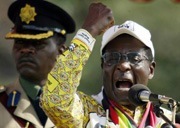
As Zimbabwe moves into a new dispensation, whether for the better or for worse, the leadership will signal how Zimbabwe moves forward in its development and growth, as well as spark debate on how this change could play a decisive role in influencing bread and butter issues — the critical ingredient to the Zimbabwe equation.
REPORT BY TONDERAI MATONHO
Despite its abundant natural resources, which are yet to be equitably distributed to the masses, Zimbabwe’s development also calls for international co-operation over access to markets and resources and more importantly, peaceful internal and external relations. These factors are an important condition for Zimbabwe to achieve moderate prosperity, as a start. Thus, Zimbabwe’s development in turn must be conducive to peaceful and improved relations.
As part of the “Zimbabwe miracle” over the past four years, to be precise, the country has been capable of maintaining rapid growth in a complicated domestic and international environment. Political and economic conditions and historical circumstances have led Zimbabwe down a path of uneven development and complexity.
One could say it is normal to have this or that challenge during a country’s development, because the last decade or so, Zimbabwe has not made any serious accomplishments to resolve the bread and butter issues — food security, service delivery, equitable and sound housing (made worse by the unforgettable Operation Murambatsvina) and full employment. Arguably, the challenges the country is facing today cannot be compared to what other African countries have faced because ours were spiced up by more of sour grapes rather than creating spaces for consensus and compromise. Given the fact that Zimbabwe has a huge natural resource base and a not-so-large population by world standards, the new leaders are confronted with mammoth tasks, especially centred on the how part of resource distribution.
It is true that every leadership has its own challenges. Nevertheless, the new leadership has been elected at a time when the country is having unprecedented global attention, low regional influence in terms of trade and growth and tactically enjoying a not-so- genuine high regional diplomacy. It is a time that Zimbabwe is shouldering a lot of domestic responsibilities. Previous experiences will not automatically be applicable to solve new challenges. The world is getting more complicated, more diverse and more mercurial, thus the new leaders are faced with a mammoth task.
Challenges cannot all be tackled at once. But with many government technocrats, social think tanks and other tenets at the country’s disposal, the emerging experiences and the masses’ efforts if supported, would help resolve them gradually and move forward towards set visions and mandates. Political will is of utmost important; the need to consult each other no matter one’s ideological leanings.
The economic growth model and transfers of structures of the economy and challenges related to people’s livelihood should be the main focus. The most important thing is the sound development of the general populace ensuring that the leadership is always aware of the needs of the people, no matter whether they are from Bulawayo or Harare. Leaders must learn to adhere to the tenets and principles enshrined in their development models, attractively captured in their manifestos. These documents should not remain as mere blueprints gathering dust, or ageing in softwares, merely used to wood-wink the masses, come national elections. The masses have expectations and these must be fulfilled.
- Chamisa under fire over US$120K donation
- Mavhunga puts DeMbare into Chibuku quarterfinals
- Pension funds bet on Cabora Bassa oilfields
- Councils defy govt fire tender directive
Keep Reading
The people of Zimbabwe waited with baited breath during and after the harmonised elections for a new crop of leaders to emerge. They listened closely to the blueprints for Zimbabwe’s future development and policies enunciated at political rallies. These new measures focussed more on the sectors closely related to people’s livelihoods, depending on one’s thrust or leanings, such as the well-being of people, employment creation, indigenisation, cross-border and national, regional infrastructure.
Moving forward, it is expected that Zimbabwe will continue on a path of growth started by the historic inclusive government. The path must not be erased. Issues of friction in relations between political parties should stop forthwith — leaders should learn to build consensus and compromise on issues and not cheap bickering, day in and day out.
As the new leadership warms up, to the new dispensation, there will be many more challenges to address, such as the bread and butter issues. These issues are key and consolidate socio-economic and political relations of Zimbabwe.











